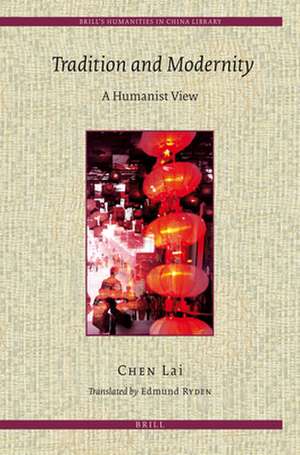Tradition and Modernity: A Humanist View: Brill's Humanities in China Library, cartea 3
Autor Lai Chen Traducere de Edmund Rydenen Limba Engleză Hardback – 16 iun 2009
Preț: 907.39 lei
Preț vechi: 1106.57 lei
-18% Nou
Puncte Express: 1361
Preț estimativ în valută:
173.63€ • 181.74$ • 144.51£
173.63€ • 181.74$ • 144.51£
Carte indisponibilă temporar
Doresc să fiu notificat când acest titlu va fi disponibil:
Se trimite...
Preluare comenzi: 021 569.72.76
Specificații
ISBN-13: 9789004165786
ISBN-10: 9004165789
Pagini: 386
Dimensiuni: 160 x 240 mm
Greutate: 0.77 kg
Editura: Brill
Colecția Brill
Seria Brill's Humanities in China Library
ISBN-10: 9004165789
Pagini: 386
Dimensiuni: 160 x 240 mm
Greutate: 0.77 kg
Editura: Brill
Colecția Brill
Seria Brill's Humanities in China Library
Notă biografică
Chen Lai, PhD. (Peking University), is a Professor of Philosophy and the director of the Center for Confucian Study and the History of Chinese Philosophy at Peking University. He is one of China's most prominent scholars of the history of Chinese philosophy, is an honorary professor at eleven universities and is a member of the editorial boards of sixteen academic journals.
Edmund Ryden, PhD. (SOAS, London University), translated Key Concepts in Chinese Philosophy (Yale 2002) and the Laozi: Daodejing (Oxford World’s Classics 2008). He has also written on the philosophical background to human rights in a Chinese context.
Edmund Ryden, PhD. (SOAS, London University), translated Key Concepts in Chinese Philosophy (Yale 2002) and the Laozi: Daodejing (Oxford World’s Classics 2008). He has also written on the philosophical background to human rights in a Chinese context.
Recenzii
"The editors have wisely chosen to lead off the series with a collection of essays by Chen Lai, who is mainland China’s most prominent scholar in the history of Confucian philosophy. The translation by Edmund Ryden is excellent, and the translator has added helpful footnotes to explain some of the references for the general reader...I strongly recommend this book for anybody who is interested in the history of twentieth-century Confucianism and what it can offer to China and the world."
Daniel Bell, Tsinghua University
“This book is the first comprehensive English-language translation of key academic works by Chen Lai (陈来) – a leading mainland philosopher and Dean of Tsinghua University’s Guoxue Research Institute (清华国学研究院).[...] Together the chapters provide deep insight into the ways that one of China’s key contemporary intellectuals has grappled with the question of how to best utilise China’s traditional culture for the nation’s modernising aspirations.[...]Edmund Ryden’s translator’s notes are an important addition to this wonderfully translated volume.[...] Ryden’s annotations provide a useful guide.They simultaneously clarify possible “less-known” facts and events, thus ensuring that the book is accessible to the general reader and experts alike.”
Selena Dramlic, University of Hong Kong, China Perspectives [Online], December 2011.
Daniel Bell, Tsinghua University
“This book is the first comprehensive English-language translation of key academic works by Chen Lai (陈来) – a leading mainland philosopher and Dean of Tsinghua University’s Guoxue Research Institute (清华国学研究院).[...] Together the chapters provide deep insight into the ways that one of China’s key contemporary intellectuals has grappled with the question of how to best utilise China’s traditional culture for the nation’s modernising aspirations.[...]Edmund Ryden’s translator’s notes are an important addition to this wonderfully translated volume.[...] Ryden’s annotations provide a useful guide.They simultaneously clarify possible “less-known” facts and events, thus ensuring that the book is accessible to the general reader and experts alike.”
Selena Dramlic, University of Hong Kong, China Perspectives [Online], December 2011.
Cuprins
Series Editors’ Foreword
Translator’s Preface
Introduction: The Humanist View
1. Retrospect and Prospect for Contemporary Chinese Thought
2. Resolving the Tension between Tradition and Modernity: Reflections on the May Fourth Cultural Tide
3. The May Fourth Tide and Modernity
4. Radicalism in the Cultural Movement of the 20th Century
5. Modern Chinese Culture and the Difficulties of Confucian Learning
6. Liang Shuming’s Early View of Oriental and Western Culture
7. The Establishment and Development of Feng Youlan’s View of Culture
8. A Reflection on the New School of Principle and Thoughts on Modernity
9. Confucian Thought and the World of Modern East Asia
10. Confucian Ethics and China’s Modernisation
11. East Asian Tradition according to Modernisation Theory
12. A Sense of Predicament and Inter-dependency
13. Liang Shuming and Max Weber on Chinese Culture
14. Values, Authority, Tradition and Chinese Philosophy
15. The Difficulty of Undertaking National Studies Research in the Nineties: The problem of the national studies fever and research into traditional culture
16. The Value and Status of Traditional Chinese Culture
Postscript: Talking of Tradition at the Turn of the Century
Postface to the revised edition
Translator’s Preface
Introduction: The Humanist View
1. Retrospect and Prospect for Contemporary Chinese Thought
2. Resolving the Tension between Tradition and Modernity: Reflections on the May Fourth Cultural Tide
3. The May Fourth Tide and Modernity
4. Radicalism in the Cultural Movement of the 20th Century
5. Modern Chinese Culture and the Difficulties of Confucian Learning
6. Liang Shuming’s Early View of Oriental and Western Culture
7. The Establishment and Development of Feng Youlan’s View of Culture
8. A Reflection on the New School of Principle and Thoughts on Modernity
9. Confucian Thought and the World of Modern East Asia
10. Confucian Ethics and China’s Modernisation
11. East Asian Tradition according to Modernisation Theory
12. A Sense of Predicament and Inter-dependency
13. Liang Shuming and Max Weber on Chinese Culture
14. Values, Authority, Tradition and Chinese Philosophy
15. The Difficulty of Undertaking National Studies Research in the Nineties: The problem of the national studies fever and research into traditional culture
16. The Value and Status of Traditional Chinese Culture
Postscript: Talking of Tradition at the Turn of the Century
Postface to the revised edition














